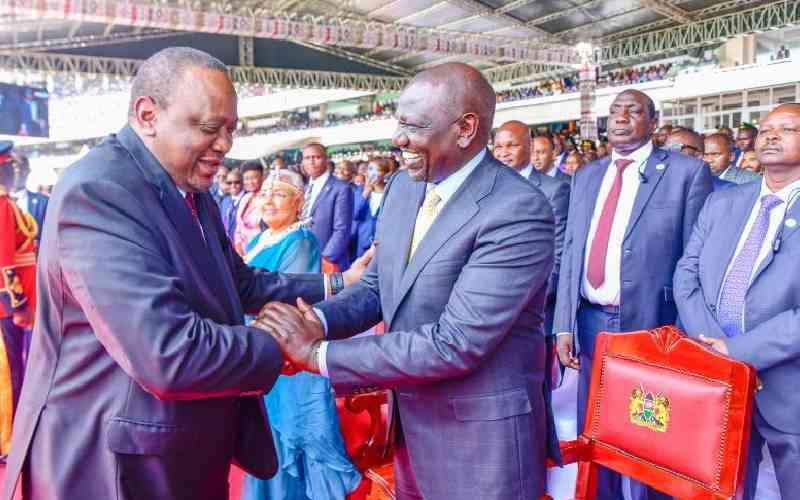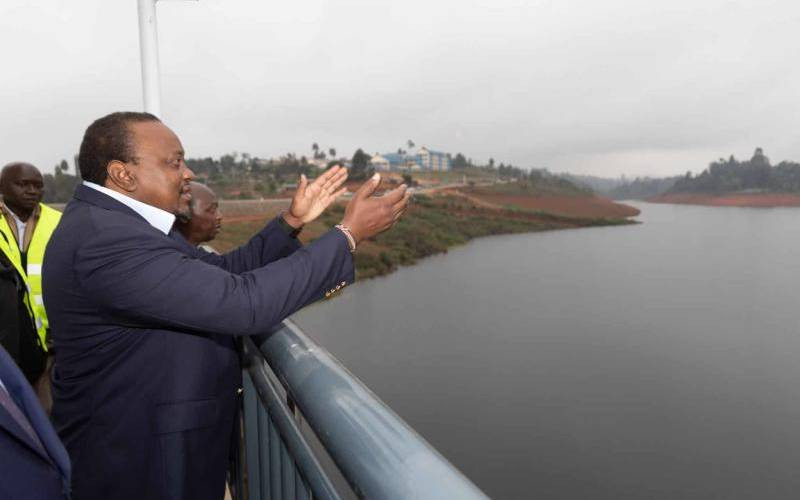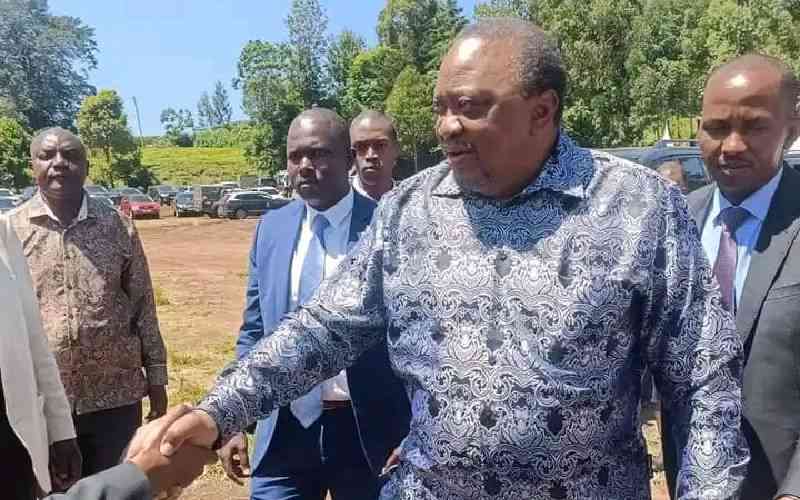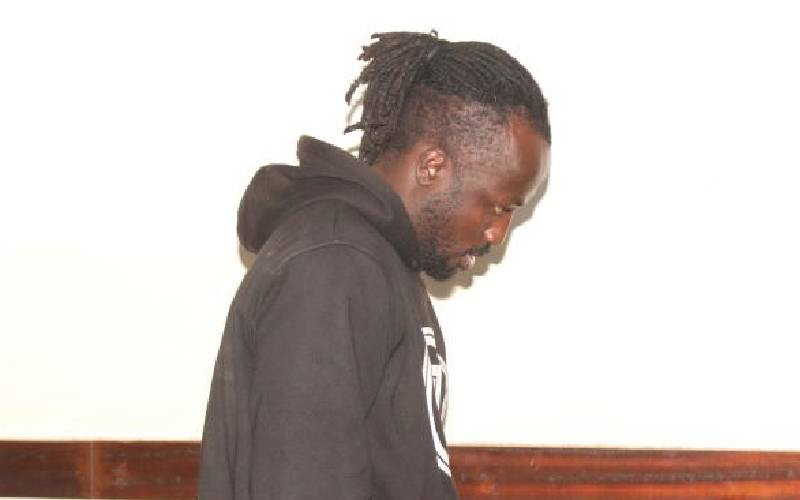Totally unprovoked, freedom fighter Achieng’ Oneko caused a stir a decade ago when he publicly told President Kibaki to his face that he did not to vote for him during the 2002 presidential polls, but instead voted for Uhuru Kenyatta, a son of a Mau Mau hero.
Perhaps owing to his advanced age and respect he commanded as a national hero, Oneko was neither booed nor physically manhandled by state security operatives. He was mourning fellow freedom fighter and member of the famed Kapenguria Six, Paul Ngei, during his burial in Kangundo, Machakos County, on August 30, 2004.
Why the grand old man chose to embarrass the Head of State and cause protocol tension remains unclear, but political observers say Oneko was irked by the presence — at the high table — of individuals he felt were interlopers.
According to Koigi wa Wamwere, who attended the funeral, Oneko wanted to demonstrate his respect and value for political heroes.
“And while there was no ‘real’ political hero on the 2002 presidential ballot, of the two main challengers – Kibaki and Uhuru – Oneko wanted to pass across the message that he was more comfortable aligning himself with the son of a comrade in the struggle, Jomo Kenyatta,” offers Koigi, a former Assistant minister and crusader of the second liberation.
Highest seat
The action by the Oneko to spite a sitting President begs the all-important question: If a President, the occupant of the highest political seat in the country, cannot pass for a hero, then who is a political hero? This is the question that has preoccupied the minds of many and one that has left the perceived real heroes – those who fought for political change from the trenches – a disgruntled lot.
No doubt, the presidency or a top government position is not the ultimate prize for political heroes. And as Kenyans mark the Mashujaa Day tomorrow, scores of unsung political heroes will be languishing away from the fanfare in the capital city of Nairobi.
Historian Macharia Munene says political leadership is a “totally different ball game”.
People, he says, will vote into office a person of their choice – without necessarily taking into account their contributions towards political or economic emancipation of the country. “But rejection at the ballot does not mean they are not heroes. It is incumbent upon the Head of State to recognise contributions of such politicians with national honours.
Instead, we see Presidents dishing out political donations to friends and sycophants in the name of national medals,” regrets Prof Munene.
Adds Koigi: “We often, as Kenyans, attribute heroism to those who have succeeded commercially. These are not the true heroes of this country. Our true political heroes are the ones who, when the lion stormed into our homestead, they fought it off fearlessly by sacrificing their own lives and safety. And thereafter, they have fought gallantly to protect this freedom to avoid retrogressing to the dark past.”
Battle-hardened
Besides him, Koigi is referring to battle-hardened politicians like former Prime Minister Raila Odinga, former Ford Asili party leader Kenneth Matiba and lawyers James Orengo, Gitobu Imanyara, Paul Muite, John Khaminwa, Kiraitu Murungi and Gibson Kamau Kuria, who consistently fought against the Kanu regime to usher in political pluralism.
Others in this group include Anyang’ Nyong’o, Michael Kijana Wamalwa, Dr Mukhisa Kituyi, Martha Karua, Charles Rubia and religious leaders, the Reverend Timothy Njoya, David Gitari, Henry Okullu and Alex Kipsang Muge. Of course, Jaramogi Oginga Odinga, Masinde Muliro and George Nthenge, who were at it right from the pre-independence era, belong to this group.
Stay informed. Subscribe to our newsletter
Nonetheless, most of the later day crusaders of the so-called second liberation have not been so lucky politically. Except for Raila, who rose to become only the country’s second Prime Minister and Michael Kijana who was the eighth Vice President, few have served in the Cabinet and as MPs, with the rest facing rejection by wananchi.
Political scientist Amukowa Anangwe points out that the general populace is ordinarily anti-change. Much as the crop of reform-minded politicians preaches change, Anangwe observes that such leaders – the world over – are generally confronted with the curse of never securing the big prize.
“Even pioneer philosophers like Machiavelli have observed the general populace is normally reluctant to embrace change and this explains why our reformers, or agents of change, have particularly not been able to make it to the top leadership,” says Prof Anangwe, who teaches at University of Dodoma, Tanzania.
According to Anangwe, other crucial and powerful players in the wings are equally keen on conservatism. To such a clique, says the former Cabinet minister, those who fought from the trenches to bring about change have been resisted.
But Koigi views it differently: “We fought so hard and by the time we were removing Kanu from power we were so tired and when that limited change came in 2002, most of us said it is time to take a break.”
Koigi regrets that this was the wrong attitude because as he observes, this is particularly the moment “the other side took time to re-strategise to recapture and entrench itself in power after infiltrating the agents of change”.
“Negative ethnicity has blinded the masses to the extent that people can only vote into power members of their community and can only see heroes as those from their communities,” says Koigi.
Turned into turncoats
According to the former MP, political heroes are people who fought selflessly for power and not for self-gain.
Koigi, however, regrets that some, who got the privilege of serving in public offices, have proved turncoats. “After getting into positions of power they lost the old passion so much that there is no difference at the end day between them and the non-reformist politicians,” regrets Koigi.
Similarly, Munene regrets that there are no serious present day political heroes, who measure up to pre-independence legends like Jomo Kenyatta and Jaramogi Oginga Odinga.
“We do not have a hero yet. For one to qualify as a hero, one needs have to look at hurdles overcome by an individual and what they have consistently confronted, and for how long. In this context, Kenya has just lost one such hero – Prof Ali Mazrui,” says Munene.
Separately, Koigi recalls visiting Jaramogi in the late 1970s at his Kisumu home, where he had been placed under house arrest by Kenyatta. Koigi was surprised to see a portrait of Kenyatta – a man Jaramogi had seriously differed with – hanging on the wall of his sitting room.
“I asked him why he was hanging the image of his sworn enemy in his house. Jaramogi responded that there were two Kenyattas – one who was a liberation hero and the other who was President, and whom he would never celebrate. The same is true about some of our leaders – in the same body there is the hero and the villain,” says Koigi.
 The Standard Group Plc is a
multi-media organization with investments in media platforms spanning newspaper
print operations, television, radio broadcasting, digital and online services. The
Standard Group is recognized as a leading multi-media house in Kenya with a key
influence in matters of national and international interest.
The Standard Group Plc is a
multi-media organization with investments in media platforms spanning newspaper
print operations, television, radio broadcasting, digital and online services. The
Standard Group is recognized as a leading multi-media house in Kenya with a key
influence in matters of national and international interest.
 The Standard Group Plc is a
multi-media organization with investments in media platforms spanning newspaper
print operations, television, radio broadcasting, digital and online services. The
Standard Group is recognized as a leading multi-media house in Kenya with a key
influence in matters of national and international interest.
The Standard Group Plc is a
multi-media organization with investments in media platforms spanning newspaper
print operations, television, radio broadcasting, digital and online services. The
Standard Group is recognized as a leading multi-media house in Kenya with a key
influence in matters of national and international interest.








